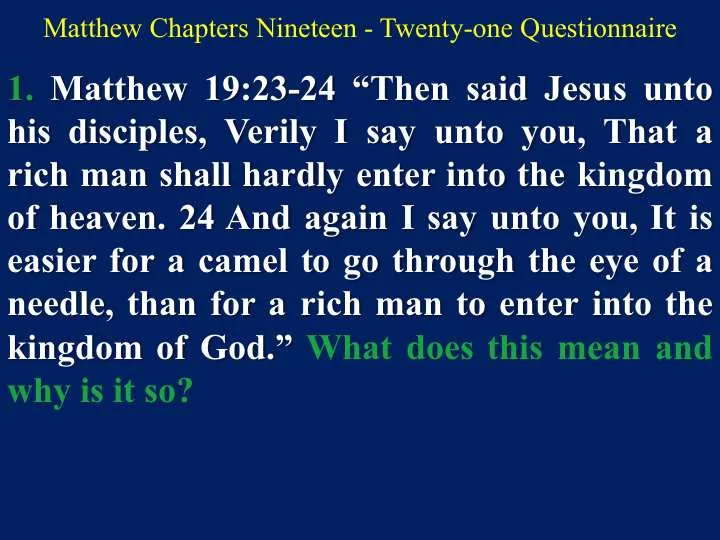

There is an expression similar to this in the Koran. "The impious, who in his arrogance shall accuse our doctrine of falsity, shall find the gates of heaven shut: nor shall he enter there till a camel shall pass through the eye of a needle. It is thus that we shall recompense the wicked." Al Koran. Surat vii. ver. 37.
1st. Riches engage the affections. 2nd. Men consider wealth as the chief good; and when this is obtained, think they have gained all. 3rd. They are proud of their wealth, and unwilling to be numbered with the poor and despised followers of Jesus. 4th. Riches engross the time, and fill the mind with cares and anxieties, and leave little for God. 5th. They often produce luxury, dissipation, and vice. 6th. It is difficult to obtain wealth without sin, or without greed, and materialism, and fraud, and oppression.
2. Explain Matthew 20:1; particularly what is the Kingdom of Heaven and who is the Householder? The figure of a vineyard (Kingdom of Heaven), to represent the rearing of souls for heaven, the culture required and provided for that purpose, and the care and pains which God takes in that whole matter.
3. Matthew 20:23 to what baptism is Jesus referring and how are we to partake of it? (“23 And he saith unto them, Ye shall drink indeed of my cup, and be baptized with the baptism that I am baptized with: but to sit on my right hand, and on my left, is not mine to give, but it shall be given to them for whom it is prepared of my Father.”)
Meaning, that they should endure much persecution for his name's sake, as all that will live godly in Christ Jesus must expect in one shape or another. Thus James, who was one of these persons, was slain with the sword by Herod; John, the other, was imprisoned, and beaten by the order of the Jewish Sanhedrim, was banished into the isle of Patmos by Domitian; and, some say, was cast into a cauldron of boiling oil, though saved in it: so that these words seem to be a prophecy of what they should suffer for Christ, instead of enjoying places of worldly honour and profit under him, they were seeking for.
4. Matthew 21:23; What is the relationship of the questions asked by (“…the chief priests and the elders of the people came unto him as he was teaching, and said, By what authority doest thou these things? and who gave thee this authority?’ ) And the counter question asked by Jesus in verse 25 concerning the baptism of John?
They saw plainly, that if they owned the divine authority of John's baptism and ministry, they must allow Jesus to be the true Messiah, J o h n b o re w i t n e s s t o ; a n d consequently, that it was by a divine authority he did what he did; and then there was an end of the question, and is the very thing that Christ had in view.
5. In Matthew 21:28-32 in Jesus’s parable of the two sons, to whom is he referring and what change took place in the one son and why? A change of mind was wrought in him, and this produced a change of life and conversation: so, many of the publicans and sinners repented of their sins of disobedience, and rebellion against God, under the ministry of John the Baptist,
Christ, and his apostles; not of themselves, men do not naturally see their sin, or need of repentance; their hearts are hard and obdurate; nor have they any spiritual sense and feeling: nothing will bring them to repentance, not the most powerful ministry, the severest judgments, or the kindest mercies, without the grace of God: but it was of God, and owing to his powerful and efficacious grace, that they repented: John Gill
Prayer Time
Recommend
More recommend